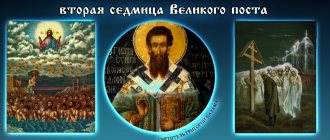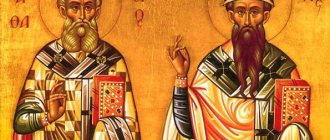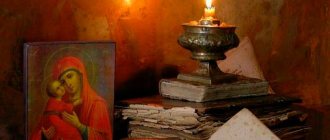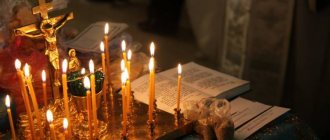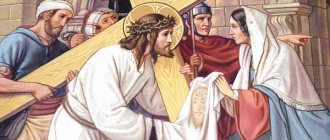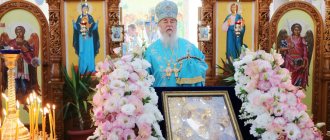To the begining
Sedmitsa:
Church Slavonic name for the week, a seven-day calendar cycle, with the countdown starting on Sunday.
Week:
in Church Slavonic, which is the liturgical language of the Russian Orthodox Church, the name of Sunday: the first (not the last!) day of the week.
Commentary: “Days of worship of the Orthodox Catholic Eastern Church. Weeks and other days." (Archpriest Gregory Debolsky)
The whole week is also called a week in the Church Charter.
, and especially
its first day
, on which Our Lord Jesus Christ rose from the dead (Mark 16:1-6) and which the Church throughout the entire year devotes mainly to the memory of the glorious Resurrection of Christ and calls it the Resurrection Day.
Name of the week
indicates the commandment of God, commanding to do six days, and not to do the seventh, that is, to devote to special service to God and neighbors, and therefore, this name belongs to every holiday, and
actually Sunday
, which, in accordance with the fourth commandment of God, stood for Christians place of the Old Testament Sabbath.
But belonging primarily to Sunday, the name of the week also belongs to the whole week
.
Like the Old Testament Church, which sometimes called the week Saturday, the name of the seventh and main day of the week (Lev. 23:15); (Luke 18:12), Christians also call the week a week, by the name of the first and main of its seven days, which are covered by the sacred commemoration performed by the Church on Sunday, or a week, and thus makes all seven days as if one during the day of worship
, or during the week.
The name of the entire week suggests that after the resurrection of Jesus Christ, who delivered us from the work of the enemy, the eternal Sabbath began - an endless circle of weeks, that is, not of carnal and vain works, but of holy works of faith and piety (Heb. 4:9) . “A new law
,” says St.
Justin the Martyr wants us to keep the unceasing Sabbath
.
Thus, every week, according to the change of the moon every seven days, forms a certain continuation of time, and in relation to Christian worship constitutes a special circle of church succession
, weekly dedicated to the remembrance of the Resurrection of Christ, and together with other special memories. For many weeks in the Orthodox Church, in addition to celebrating the Resurrection of Christ, are dedicated to special memories, for example: the week of Thomas, the week of the Myrrh-Bearing Women, Pentecost, and so on.
The weeks in the Church Charter are counted regardless of either the New Year, which begins in January, or the indictment, which begins in September. According to instructions on how to read St. The Gospel, the order of weeks begins with Easter, as the most important of Christian events (1 Cor. 15, 14) and holidays
. In the Church Rules, the order of weeks begins after the eternal days of worship, divided into 12 months, and after the month of August is set out in the Rules for the succession of the triodion.
Third week of Lent in 2022: March 29 - April 3
.
(separate article with materials for preparing for the Sunday Liturgy: week (Sunday) of the Worship of the Cross)
Third week of Great Lent: encouragement and strengthening of those who struggle
When starting a feat and finishing it, we are usually inspired. At first - with the consciousness of the strength within oneself that is still fresh and untested, and finally - with the hope of an imminent and successful ending. But the middle of the field is often a dangerous stumbling block for us
.
Thus, the Church, never leaving her children without consolation and encouragement, among the exploits of Great Lent, with which those who fast and repent must crucify their flesh with passions and lusts, from the third week of Lent begins to especially encourage and strengthen those who struggle
, presenting to our hearts and eyes examples of pious asceticism , selflessness and patience.
Thus, in the third week of Great Lent, she, guiding us to mortify passions and lusts
, inspires us
to defeat them like Gideon
, who defeated the Midianites;
- overcome them, like Sampson
, who killed the beast;
- kill them like Goliath
;
- to humble them like Daniel
, who tamed the beasts in the den, and
praises
fasting more than
it prescribes
;
more often sings of
its desired fruits than
exposes
our sinful wounds, which are healed by fasting.
“O fatherly treasure, wonderful possession, mother of all who served the Lord Christ, come, brothers, let us enjoy fasting: for this strengthens the body, enlightens the mind and heart.” (Song 8 of the canon, Monday 3 weeks)
“We love fasting, the souls of the fiercest passions, withering away by the action of the spirit, and strengthening the divine deeds, and sending the mind to heaven, interceding for forgiveness from the generous God” (Monday evening on “I cried to the Lord”)
Third week of Great Lent: features of divine services
Reading the Apostle at the Liturgy on Saturday of the third week
The Church inspires us
not to weaken in patience
in the name of the Lord Christ (Heb. 10:32-38); and from the Gospel the words are preached that the health of a doctor is not required, but the sick (Mark 2:14-17).
Especially for consolation and encouragement
For those who repent during Lent, the Church points in the third week of Great Lent to the Life-giving Cross of the Lord, beginning
the synaxarion
this week with the verses:
“Let the whole earth worship the Cross: I have known to worship You, the Word.”
Tree of Suffering and Death
The Lord, represented by the Church as fasting during Lent, according to the interpretation of the Church, is like
the tree of life in paradise
;
- like a tree
, which, during the fourty-year wandering of the people of God in the desert, was placed among the bitter waters of Marah for their
delight
;
- like a hay-leaved tree
, under the shade of which tired travelers stop to
cool off and rest
, led to the promised land of eternal inheritance
(Synaxarion on the third week of Quadrency)
.
Reminding those who fast of the suffering and death of the Lord, who voluntarily endured Him for the salvation of the world, the all-honorable and life-giving Cross graciously inspires
believers and to continue fasting, prayer and sanctification.
If the Lord was crucified for our sake, then shouldn’t we, for His sake, renounce worldly pleasures
that hinder the deeds of piety?
“Let us crucify us for the sake of Him who was crucified, let us put to death all the pains of the flesh in fasting and prayers and supplications” (service on Wednesday of the third week of Pentecost)
Having preached the good news about the Cross and His worship in the midst of the Lenten season, inspiring those fasting with the example of the crucified Savior, it comfortingly reminds
us and about the approaching bright holiday of the glorious resurrection of Christ.
The cross is the foreshadowing
of the celebration of Easter.
At the solemn meeting of the winner, his victorious signs usually precede him
: thus the Easter of Christ, the procession of the Conqueror of sin and death is preceded by the sign of His victory - the Life-giving Cross.
So, if we suffer
, then we
will be glorified
, if we
die
, then we
will rise
.
To our consolation, the sufferings of the Savior are depicted in church hymns of the third week of Pentecost together with the joyful resurrection
Savior.
This pre-depiction
of the resurrection of Christ, so joyful for believers, is made up of
the Easter Irmos
, placed in the canon at the Matins of the Week of the Cross. Unfortunately, this important feature, which, according to the intention of St. The Church, a lofty goal, remains almost unnoticed, since the Easter irmos themselves are rarely sung anywhere at this time.
After the great doxology at Matins, while singing “Holy God,” the Cross, decorated with green flowers, signs of life, is brought out among the believers to worship and kiss it. When venerating the Cross and kissing it, the Church exclaims: “We worship Your Cross, O Master, and we glorify Your holy Resurrection.”
This is also sung at the Liturgy instead of “Holy God.”
By reading the Apostle, the Church preaches that bearing the cross is made easier for us by Him Himself Crucified for us on the Cross.
“Since we have a great bishop who has passed through the heavens, Jesus the Son of God, let us hold fast to the confession.” (Heb. 4:14)
“The imams are not able to sympathize with our weaknesses, but are tempted in every way according to the likeness of sin” (Heb. 5:6)
By reading the Gospel, the Church preaches, in the words of the Lord, the duty of self-sacrifice and adherence
Him for salvation.
“Whoever wants to come after Me, says the heavenly Hero, let him deny himself and take up his cross and come after Me.” (Mark 8:34)
“Whoever wants to save his soul will destroy it; and whoever loses his life for the sake of Me and the Gospel, he will save it” (Mark 9:1)
Prayers for the departed for this day
It is customary to prepare in advance for Saturday of the third week. It is better to find the prayers that are read in front of the icons in the prayer book and remember some of them. As a rule, Christians turn to Jesus, who gives peace to those who have ended their earthly life, and also ask for reassurance to those relatives or friends who did not believe in Heavenly paradise during their lifetime. One of the most relevant prayers is the text “Our Father”. In addition, parishioners turn to the Holy Trinity.
For example, Orthodox believers may pray for those who have committed suicide. Despite the fact that taking one's own life is considered a special sin, no one forbids asking for reassurance for a suicide.
The Lord's mercy can extend to sinners if a large number of sincere prayers are sent for them.
Trisagion
Holy God, Holy Mighty, Holy Immortal, have mercy on us. (Read three times, with the sign of the cross and a bow from the waist.) Glory to the Father and the Son and the Holy Spirit, now and ever and unto ages of ages. Amen.
Prayer to the Most Holy Trinity
Most Holy Trinity, have mercy on us; Lord, cleanse our sins; Master, forgive our iniquities; Holy One, visit and heal our infirmities, in Your name. Lord have mercy. (Three times) Glory to the Father and the Son and the Holy Spirit, now and ever and unto ages of ages. Amen.
Lord's Prayer
Our Father, who art in heaven! Hallowed be Thy name, Thy kingdom come, Thy will be done, as it is in heaven and on earth. Give us this day our daily bread; and forgive us our debts, just as we forgive our debtors; and do not lead us into temptation, but deliver us from the evil one.
Lord, have mercy (12 times).
Remember, O Lord our God, in the faith and hope of the life of Thy eternally departed servant, our brother (name), as Good and Lover of mankind, forgiving sins and consuming untruths, weaken, forsake and forgive all his voluntary and involuntary sins, deliver him from eternal torment and the fire of Gehenna, and grant him the communion and enjoyment of Your eternal good things, prepared for those who love You: even if you sin, do not depart from You, and undoubtedly in the Father and the Son and the Holy Spirit, You are glorified God in the Trinity, faith, and the Unity in the Trinity and the Trinity in Unity is Orthodox even until his last breath of confession. Be merciful to him, and have faith in You instead of deeds, and rest with Your saints as You are Generous: for there is no man who will live and not sin. But You are the One besides all sin, and Your truth is the truth forever, and You are the One God of mercies and generosity, and love for mankind, and to You we send glory, to the Father and the Son and the Holy Spirit, now and ever and unto the ages of ages. Amen.
Troparion, tone 4
With the spirits of the righteous who have passed away, the soul of Thy servant (Thy servant), O Savior, give rest, preserving them in the blessed life that is with You, Love for Mankind.
In Thy chamber, O Lord, where all Thy saints rest, rest also the soul of Thy servant, for Thou art the only Lover of mankind.
Glory to the Father and the Son and the Holy Spirit.
Thou art God, who descended into hell, and loosed the bonds of the bound, and give rest to Thy servant Himself and the soul.
And now and ever and unto ages of ages.
One pure and immaculate Virgin, who gave birth to God without a seed, pray to his (her) soul to be saved.
Kontakion, tone 8
With the saints, rest, O Christ, the soul of Thy servant (Thy servant), where there is no sickness, no sorrow, no sighing, but endless life.
Ikos
Thou art the One Immortal One, who created and created man, on earth we were created from the earth, and to the other earth we will go, as Thou Who Created me commanded, and to me: as Thou art the earth, and thou art gone to the earth, and even all men may go, creating funeral lamentations song: alleluia, alleluia, alleluia.
Week of Cross Worship
a separate article with materials for preparing for the Sunday Liturgy: week (Sunday) of the Veneration of the Cross
From the gospel of the Cross and the veneration of the Life-giving Cross, third week
Lent is called the Worship of the Cross. The beginning of its establishment dates back to the ancient times of Christianity. Between the works of St. John Chrysostom has a teaching for this week, in which he among other things says:
“The annual day, revered and bright by all, the middle week of St., has returned to us. fasts, bringing the blessed and life-giving Cross of our Savior Jesus Christ, offering it for worship and sanctifying those who worship with a sincere heart and pure lips and making them more prepared and courageous to perform the field of the Holy. posts"
St. Sophronius, Patriarch of Jerusalem, in the 7th century, on the week of the Worship of the Cross, said in his word:
“Look at a traveler going towards a certain goal. Walking a certain part of space every day, although he sometimes becomes exhausted from the length of the journey undertaken, however, having rest in mind, he willingly continues the journey he has begun. And what are we all now if not wanderers? God, the lover of mankind, through tradition from the saints, the Father, Himself opens before us the path that lies before us - I say, a holy and saving fast, so that we, having worked on it, at least to some extent
, may be honored to receive forgiveness of sins, and from the sinful thirst and remorse that torment us delivers from lusts through the touch and kiss of the honorable and life-giving Cross.
Both means with equal benefit can prepare us for the worthy meeting of St. day of Resurrection; fasting
because it will maintain
good vigor in the body
, and
worship of the present
Life-giving Cross will distract our thoughts
from shameful thoughts and deeds
and direct our gaze to the heavenly dwelling.
Let us therefore praise fasting; but praising it and all the benefits that flow from it for man, let us also praise the honorable tree of the Cross that is set before us for worship and call to it with our hearts and lips: Rejoice in the Cross, on which the Son of God, with outstretched arms, accepted us all into his embrace and reconciled with the Heavenly Father! Rejoice, our cleansing from sinful defilements! Rejoice, shield of the great King, under whose shadow every victory is prepared! Illuminate us, most honorable Cross, with the power hidden within you; - create, so that we too may freely desire to suffer
, albeit a little, for the One who first laid His life on you for us; make us worthy to greet with joy the luminous day of the Resurrection, as a guarantee of the inheritance of the eternal blessings prepared for us.”
In the conversations of Theodore the Studite, a writer of the 9th century, the worship of the Cross during Pentecost is pointed out as already an ancient custom of the Church. In the same century, Joseph and Theodore the Studites wrote many songs of praise for the third week of Pentecost, now performed by the Church.
This Week is the middle of Lent. It is called Cross Veneration because during this period of Lent, a Cross decorated with flowers is brought out of the altar for veneration. The cross remains in the middle of the temple until Friday of the 4th week of Lent.
On Sunday (at Matins), as well as on the following Monday and Wednesday (at the 1st hour), as well as on Friday (after the dismissal of the Hours), worshipers in the church worship the honorable and life-giving Cross. In total, veneration of the Cross during Great Lent is performed at services four times listed.
The meaning of carrying out (carrying out) the Cross and worshiping it during the Week and the following week is explained in liturgical texts: in the Synaxari, in the stichera, in the canon. Lent for Orthodox Christian believers is compared to the Jews' stay in the desert. How then the Jews (Old Israel) suffered from thirst in the desert, and Moses lowered the tree and made the waters of Marah sweet (Ex. 15:23), ; Likewise, the Orthodox Church brings out the Life-Giving Cross for worship in the middle of Lent, sweetens fasting for believers and satisfies the spiritual thirst of Orthodox Christians (people of New Israel).
The Wednesday of the Week of the Cross is called Mid-Lent in the Typikon, as well as Mid-Lent, due to the fact that this is the middle of Great Lent; this is also stated in the service, for example, in the verse stichera at Matins:
“Having pierced the abyss of abstinence...”
The liturgical Charter emphasizes that this day is not a holiday:
“on Wednesday, at the meal it is not worthy to allow oil and wine, for it is a day of mourning, and not of joy”
A natural question arises: why was the instrument of execution of the Savior held in such esteem by Christians?
The fact is that the veneration of the Cross has always been understood by the teachings of the Church as the worship of Jesus Christ in the light of His redemptive feat. Crosses on domes, pectoral crosses, worship crosses installed in memorial places - all of them are designed to remind us of the terrible and dear price at which Jesus Christ accomplished our salvation. Christians do not worship the instrument of execution, honoring the cross, but Christ Himself, turning to the greatness of the sacrifice in which Jesus Christ offered Himself for all of us.
In order to heal the damage that sin has brought into human nature, the Lord in His incarnation takes upon Himself our nature, and with it the damage that in the teaching of the Church is called passion, corruption, and mortality. Having no sin, He accepts these consequences of sin voluntarily in order to heal them in Himself. But the price of such healing was death. And on the Cross, the Lord paid it for all of us, so that later, by the power of His Divinity, He could resurrect and show the world a renewed human nature, no longer subject to death, illness and suffering. Therefore, the Cross is a symbol not only of the atoning death of Christ, but also of His glorious Resurrection, which opened the way to heaven for all who are ready to follow Christ.
One of the chants heard in the Church during the Week of the Cross, in modern Russian, sounds something like this:
“The flaming sword no longer guards the gates of Eden: it is miraculously extinguished by the Tree of the Cross; the sting of death and hellish victory are no more; for You, my Savior, appeared with a cry to those in hell: “Go again to heaven!”
The cross was given to us as a sign on our foreheads, just as circumcision was given to Israel. For through him we, the faithful, are distinguished from the unbelievers and are known. He is a shield and a weapon, and a monument to victory over the devil. He is a seal so that the Destroyer will not touch us, as Scripture says (Ex. 12:12, 29). He is the rebellion of those who lie down, the support of those who stand, the staff of the weak, the rod of the shepherd, the returning guide, the prosperous path to perfection, the salvation of souls and bodies, the deviation from all evils, the author of all good things, the destruction of sin, the sprout of resurrection, the tree of Eternal Life.
Church Charter
The duration of Lent is 7 weeks, and its main purpose is preparation for Easter. A person should celebrate this holiday with spiritual purity. To do this, it is not enough just to limit yourself in food. You need to give up all worldly temptations and pray to the Lord as much as possible, study the Holy Scriptures and attend church services. Therefore, Lent is not a diet, but first of all working on yourself, your thoughts and lifestyle.
The church charter states that laity should avoid quarrels and conflicts, as well as any entertainment, trying to spend as much time as possible with their family and in prayer.
A simple way to grow a new flower from the stump of a wilted orchid
Photo of asteroid 2001 FO32, which flew safely past Earth
An epidemiologist said whether re-vaccination with Sputnik V is possible
